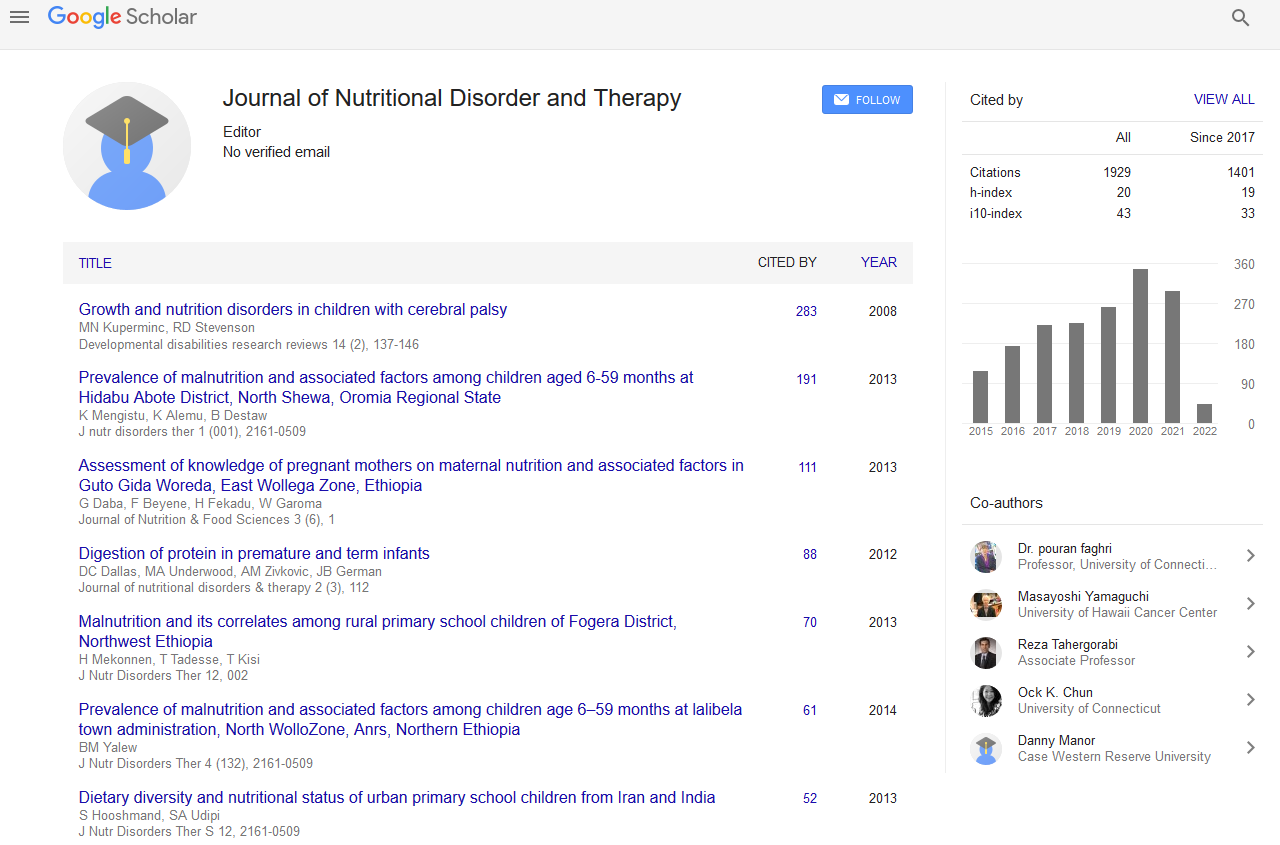Indexed In
- Open J Gate
- Genamics JournalSeek
- Academic Keys
- JournalTOCs
- Ulrich's Periodicals Directory
- RefSeek
- Hamdard University
- EBSCO A-Z
- OCLC- WorldCat
- Publons
- Geneva Foundation for Medical Education and Research
- Euro Pub
Useful Links
Share This Page
Journal Flyer

Open Access Journals
- Agri and Aquaculture
- Biochemistry
- Bioinformatics & Systems Biology
- Business & Management
- Chemistry
- Clinical Sciences
- Engineering
- Food & Nutrition
- General Science
- Genetics & Molecular Biology
- Immunology & Microbiology
- Medical Sciences
- Neuroscience & Psychology
- Nursing & Health Care
- Pharmaceutical Sciences
Tocotrienol, a rising star in functional ingredient
JOINT EVENT: 13th International Congress on Advances in Natural Medicines Nutraceuticals & Neurocognition & 14th International Conference on Clinical Nutrition
July 27-29, 2017 Rome, Italy
Wei Ney Yap
Davos Life Science Pte. Ltd., Singapore
Scientific Tracks Abstracts: J Nutr Disorders Ther
Abstract:
Tocotrienol (T3) is the other half of the vitamin E family. Like tocopherol (TP), T3 provides antioxidant protection to all living cells. T3 and TP share similar chemical structures in the chromanol ring but differ from their side chains. Each T3 and TP has four homologues: Alpha (α), beta (β), gamma (γ), and delta (δ) depending on the number and location of methyl groups on the chromanol ring. T3 and TP are closely related yet vary widely in their effectiveness inT3 is shown to possess up to 60 times more superior anti-oxidative activity compared to TP. In addition, T3�??s distinct chemical structure gives it more fluidity, enabling its cellular uptake in biological systems to be up to 70 times higher than TP. The naturally occurring T3 is scarce in nature. They are found abundantly in crude palm oil extract. Other sources are from rice (bran), annatto and wheat. Toxicology and pharmacology studies showed that supplementation with palm based T3 up to 2500 mg per kg of body weight did not cause any significant adverse effects. A growing awareness of T3�??s distinct health benefits has fuelled an increasing number of research studies worldwide, despite TP is regarded as the more common vitamin E in the market nowadays. Cumulative in vitro, animal models and human clinical trials have convincingly shown that T3 possesses biological activities such as anti-inflammatory, anti-cancer, balancing cholesterol lipid profiles, neuroprotection, anti-cancers and other biological activities. All these benefits are not seen in TP. Increasing health concerns among the aging population coupled with the health awareness benefits either in acute or chronic diseases is expected to drive T3 demand in dietary supplements. Antioxidation property of T3 is expected to spur product demand in personal care & cosmetic industry. In addition, cholesterol and lipid lowering characteristic is expected to drive T3�??s demand in nutraceutical and pharmaceuticals industries.
Biography :
Wei Ney Yap (PhD) earned her degree from University of Singapore. She is now the Section Head of Biological section at Davos Life Science Pte Ltd. She has more than 10 years’ research experience in tocotrienols (a palm oil derived natural vitamin E), specifically the benefits and mechanism of actions of this lipid soluble vitamin in human health and nutrition. Her research work has received Educational Fellowship Award from the European Academy of Dermatology Venereology (EADV) in 2014. Moreover, the company she is currently working with has previously received 2010 Asia Pacific Frost & Sullivan Excellence in Research Award in the Natural Vitamin E Market.


